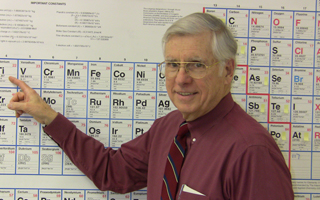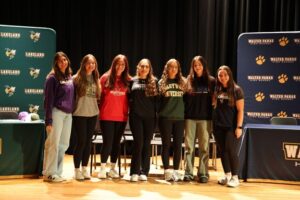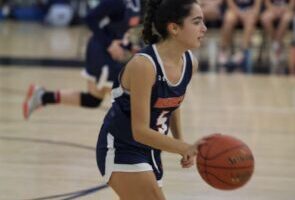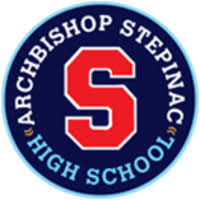 “I had Mr. Benedict.” This bold statement was delivered by the mother of a middle school friend of mine as we discussed her daughter’s list of seventh grade teachers. It occurred to me suddenly, how quintessential this phrase is throughout the overlapping generations of our community. In fact, the more appropriate question should be: who hasn’t experienced the teaching of our very own David Benedict, Sr.?
“I had Mr. Benedict.” This bold statement was delivered by the mother of a middle school friend of mine as we discussed her daughter’s list of seventh grade teachers. It occurred to me suddenly, how quintessential this phrase is throughout the overlapping generations of our community. In fact, the more appropriate question should be: who hasn’t experienced the teaching of our very own David Benedict, Sr.?
Surely all of his former students remember their seventh grade year in science as one that stood out amongst the rest of their middle and high school careers, one full of creative experiments and witty commentary, sprinkled with a light dose of sarcasm when needed to correct a student at fault. Once you walked into that classroom, the concept of science became more than printed words from a relic of a textbook; it became what it truly is, and what it should always be taught as – a fascinating aspect of life.
Such a surplus of years in the educational field can render all types of emotional changes in a person, and although his résumé casts him in quite the spotlight, Benedict doesn’t come across as grandiose in any sense. Perhaps the reason for his ever-growing fan club is his all-encompassing sense of humility.
“I feel very humbled and honored,” Mr. Benedict said in a reflective manner, in response to the award he is to receive on April 9th at the Annual Dinner Dance & Auction hosted by the Foundation for the Public Schools of the Tarrytowns. At this event Benedict will be honored for his monumental contribution as a science teacher in our district, a legacy that started back in 1962 when he began teaching in Washington Irving as a General Science and Health teacher. “You taught all areas. Each grade level had a different assignment — Biology, Chemistry, Earth Science or Physics—it varied,” he remarked.
This decade-defining teaching stratagem came with certain requirements: first of all, a genuine love of the subject, followed by the creativity and flexibility to keep the subject fresh for the student and teacher alike; both components are things that Benedict mastered long ago.
“I was very interested as a ‘youngster’,” he said, recalling his juvenile years of insect collecting and the studying of an assortment of amphibians and reptiles. “My [parents] encouraged my exploration into the areas of the sciences.” He noted how this primary fascination served as a prelude to his full-fledged teaching career.
On the subject of keeping the topic fresh, Benedict responded that, “Each year equals a new challenge. I look to delving deeper into the curriculum…The experiments are different, the approaches are different.” Like any good scientist, Benedict surely knows that change is the only consistency.
In direct comparison to his relaxed and forward-thinking attitude, the conversation quickly established a route of discussion not linked to the past, but to his present and future teaching years. He remarked how “the beauty of Sleepy Hollow,” is that “I get to see [my students] for six years…I get the biggest pride when kids call me up [for advice]. I like to follow what they do.”
It is a well-known fact that the “kids” appreciate and value Mr. Benedict as much as he does them. He is revered as the knowledgeable teacher who just seems to know everything. In what captures the essence of students’ feelings towards him, one awestruck highschooler exclaimed, “He’s, like, God!” This statement surely draws into perspective why so many students would, if given the option, choose to “phone” Mr. Benedict on “Who Wants to Be a Millionaire.”
This admiration is not superficial, but something that runs deep throughout students’ post high school lives. The reason? An impressionable curriculum with memorable trips and experiments of Benedict’s that offers something for every taste: Enjoy hands-on field work? How about the annual UConn Marine Biology study field trip, where students get to enjoy a day aboard a trawl boat, catching everything from starfish to flounder, not to mention having the opportunity to kiss the salty buoy.
Are you a sucker for space? Try a reenactment of the landing of
Apollo 13, instructed by IBM engineers, where you have to safely build a contraption around a designated egg so as to aid its safe landing, yolk-free, of course. Operation A Pollo 13 has commenced.
Something new this year is the all-inclusive “Bio Bus” scheduled to take place this coming June. The community-sponsored event will consist of regional scientists working with students on various scientific experiments, all in the comfort of this well-equipped laboratory-on-wheels.
“This is the love of my life,” Benedict stated truthfully. “I have the best job where I get to work with young people, and get them to think and to develop intellectually, to explore the world around them.” From his voice emanated great pride, something that can only be achieved by actively doing what one loves. “I think you will find me with my grandchildren, teaching them the wonders of science.”
Thinking about the honorary event to come, he spoke openly about his responsibility to the Villages in words that sum up his ongoing experience as a teacher: “I’m entrusted with teaching the children of our communities. I want them to have the same love of science that I [have] had.”
Mr. Benedict’s closing advice for success? “Read as much as the day permits you to, work outside of your comfort zone, try a little bit more [to see what you] can achieve—that’s what education is about.” ©
Amelia Rose attends Sleepy Hollow High School






